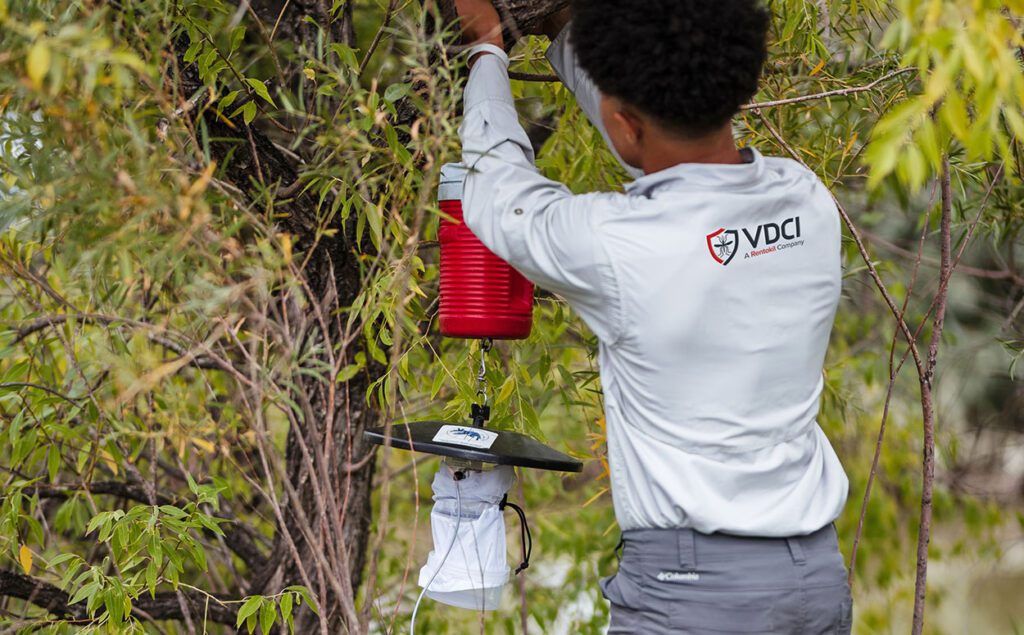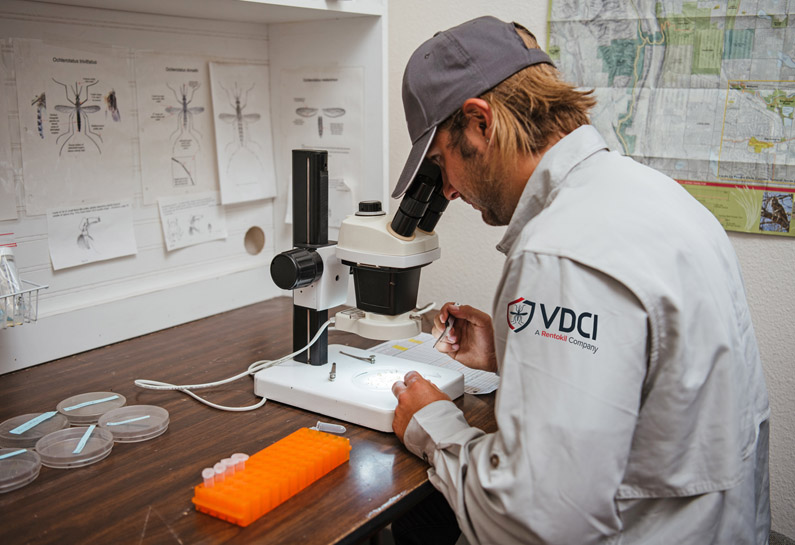What is mosquito surveillance? Why is it important?
While most people believe that mosquito control is nothing more than truck or backpack-based applications of pesticide, in reality, spraying to control adult mosquitoes is just one small aspect of a well-managed integrated mosquito management program. In fact, the foundation of every effective mosquito control program is mosquito surveillance.
What is a Mosquito Surveillance Program?
Mosquito Surveillance Programs involve the routine monitoring of both larval and adult mosquito populations over the course of an entire mosquito season.
While most people believe that mosquito control is nothing more than truck or backpack-based applications of pesticide, in reality, spraying to control adult mosquitoes is just one small aspect of a well-managed integrated mosquito management program. In fact, the foundation of every effective mosquito control program is mosquito surveillance.
Mosquito Surveillance Programs involve the routine monitoring of both larval and adult mosquito populations over the course of an entire mosquito season.

4 Reasons Why Mosquito Surveillance Programs Are Necessary
Mosquito surveillance is critical to a successful municipal or commercial mosquito control program for several reasons:
1. Monitoring changes in mosquito populations
2. Identifying which mosquito species are present
3. Detecting mosquito-borne diseases
4. Determining what control measures need to be conducted
1. Monitoring changes in mosquito populations
Monitoring changes in mosquito populations is important because it allows mosquito control experts to track exactly where the larval and adult mosquito populations are rising or falling. These data, when compared to previous weeks or previous years, provides the knowledge we need in order to identify and predict perennial, sporadic, or new problem areas, as well as to predict possible increases in the risk of mosquito-borne diseases. There is various mosquito surveillance equipment and several types of mosquito surveillance tools that are utilized to help monitor mosquito populations, including larvae dip cups, adult mosquito traps, and laboratory equipment.
2. Identifying which mosquito species are present
Identifying which mosquito species are present provides mosquito biologists with information they can use to locate mosquito breeding habitats, determine the severity of a nuisance mosquito outbreak, and provide knowledge about what mosquito-borne diseases may be present in a given area. Different mosquito species often display different behaviors and may require different control measures due to variations in their life histories. Many mosquitoes have different breeding habitats, activity (biting) periods, host preferences and maybe most importantly, which diseases they can transmit.

3. Detecting mosquito-borne diseases
Detecting mosquito-borne diseases is one of the most important reasons for implementing a comprehensive mosquito surveillance program. Highly trained mosquito biologists work in a lab to identify and count all of the mosquitoes that are collected and either send the appropriate species to State or University labs for testing, or test them in-house for specific diseases, such as West Nile virus. In most cases, the diseases that mosquitoes can transmit to humans and animals can be detected in the mosquitoes themselves, weeks before they can be passed on, which gives experts the opportunity to take all of the appropriate control actions in order to reduce the risk of human disease transmission.
4. Determining what control measures need to be conducted
Mosquito surveillance tools and strategies enable mosquito management experts to actively monitor population levels and the threat of disease. When mosquito populations reach identified thresholds or there is a mosquito-borne disease threat identified, data from surveillance is used to ensure that mosquito spray applications are conducted at the right time and in the right places for the most effective and safe control.
How is Mosquito Surveillance Done?
Mosquito surveillance is typically conducted by first dividing a program area such as a city, county or industrial facility into control zones. Within each zone an experienced field technician collects mosquito larvae from standing water sources using standardized dipping techniques, while surveillance technicians set adult mosquito surveillance traps. Adult mosquito surveillance traps are left out over-night, collected the following day, and taken to a lab for counting, identification and disease testing. There are several types of adult mosquito traps used in effective mosquito surveillance programs, each with its own advantages, depending upon what specific information is desired. Some of the mosquito surveillance traps commonly used include:
• CDC Miniature Light Traps
• Gravid Traps
• New Jersey Light Traps
• BG-Sentinal Traps
• Ecovec MosquiTRAPs
• Landing Rate Counts
It is highly recommended that any municipality or large industrial operation conduct a comprehensive mosquito surveillance program as the first step towards protecting the public health of its citizens or employees. The experienced team at Vector Disease Control International (VDCI) collects and analyzes several hundred thousand mosquitoes every year for cities, counties, districts and companies across the United States. If you would like more information about any aspect of mosquito surveillance or control, please CONTACT US and we will help you get started immediately.
Government Partners in Mosquito Management: Contact Us Today
Mosquito surveillance is an important component of an integrated mosquito management program. Our team of mosquito management experts take pride in partnering with municipalities, mosquito abatement districts, county, and state entities and are here to help guide you in delivering environmentally-conscious and cost-effective mosquito management.
Complete the form below or call 855-493-2695 to connect with a mosquito surveillance expert.
 Since 1992, Vector Disease Control International (VDCI) has taken pride in providing municipalities, mosquito abatement districts, industrial sites, planned communities, homeowners associations, and golf courses with the tools they need to run effective mosquito control programs. We are determined to protect the public health of the communities in which we operate. Our mosquito control professionals have over 100 years of combined experience in the field of public health, specifically vector disease control. We strive to provide the most effective and scientifically sound mosquito surveillance and control programs possible based on an Integrated Mosquito Management approach recommended by the American Mosquito Control Association (AMCA) and Centers for Disease Control and Prevention (CDC). VDCI is the only company in the country that can manage all aspects of an integrated mosquito management program, from surveillance to disease testing to aerial application in emergency situations.
Since 1992, Vector Disease Control International (VDCI) has taken pride in providing municipalities, mosquito abatement districts, industrial sites, planned communities, homeowners associations, and golf courses with the tools they need to run effective mosquito control programs. We are determined to protect the public health of the communities in which we operate. Our mosquito control professionals have over 100 years of combined experience in the field of public health, specifically vector disease control. We strive to provide the most effective and scientifically sound mosquito surveillance and control programs possible based on an Integrated Mosquito Management approach recommended by the American Mosquito Control Association (AMCA) and Centers for Disease Control and Prevention (CDC). VDCI is the only company in the country that can manage all aspects of an integrated mosquito management program, from surveillance to disease testing to aerial application in emergency situations.

